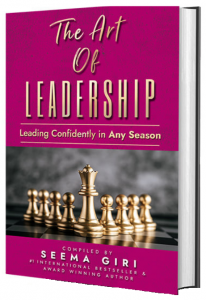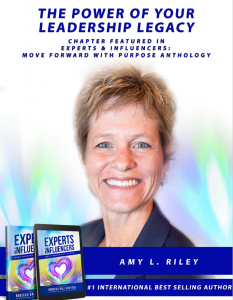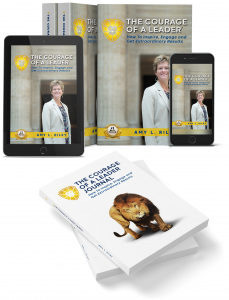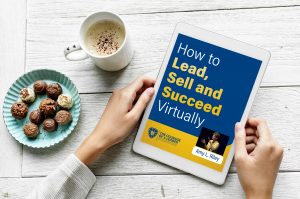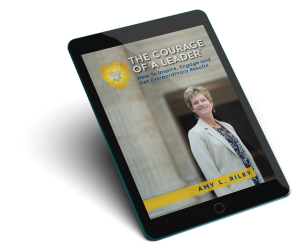Jennie Lopez is the author of the Intentional Unicorn, and she embodies fully the idea of bringing your whole self to work. She shares with us in this episode about why it’s important to bring your authentic self to work, and she gives us real examples about how to do so.
About the Guest:
Jennie López embodies “Bring Yourself to Work” in everything she does. She empowers diversity and engages employees and organizations to achieve new highs. Her superpower? Her authenticity! She realized that her strengths are a combination of her Latinx heritage, passions, and learnings from being a mom.
Jennie is originally from Puerto Rico and moved to the US to complete her Master’s Degree in Chemical Engineering. Her engineering career includes roles in Manufacturing & Quality and in the executive suite as Chief Operating Officer. Jennie is also an executive board member for the Organization of Latinx focusing on developing and accelerating Latinx talent at her company.
In parallel she has also found success in her dancing and fitness careers. Her experiences include: Back up dancer for artists like Julio Iglesias and Ednita Nazario, Superbowl Winning NFL Cheerleader, and Zumba Master Trainer.
After many years of working hard to hide her unicorn horn she realized that’s where magic takes place. She is now proud of being an intentional unicorn and empowers others to do the same.
Instagram: www.instagram.com/intentionalunicorn
LinkedIn: www.linkedin.com/in/intentionalunicorn
YouTube: www.youtube.com/@intentionalunicorn
TikTok: www.tiktok.com/@intentionalunicorn
Website: www.intentionalunicorn.com
About the Host:
Amy L. Riley is an internationally renowned speaker, author and consultant. She has over 2 decades of experience developing leaders at all levels. Her clients include Cisco Systems, Deloitte and Barclays.
As a trusted leadership coach and consultant, Amy has worked with hundreds of leaders one-on-one, and thousands more as part of a group, to fully step into their leadership, create amazing teams and achieve extraordinary results.
Amy’s most popular keynote speeches are:
The Courage of a Leader: The Power of a Leadership Legacy
The Courage of a Leader: Create a Competitive Advantage with Sustainable, Results-Producing Cross-System Collaboration
The Courage of a Leader: Accelerate Trust with Your Team, Customers and Community
The Courage of a Leader: How to Build a Happy and Successful Hybrid Team
Her new book is a #1 international best-seller and is entitled, The Courage of a Leader: How to Inspire, Engage and Get Extraordinary Results.
https://www.linkedin.com/in/amyshoopriley/
Link mentioned in the podcast
How to Use What We Know About Neuroscience to Be Exponentially More Influential (podcast episode): https://courageofaleader.com/captivate-podcast/how-to-use-what-we-know-about-neuroscience-to-be-exponentially-more-influential-with-laura-berger/
The Courage to Be An Inclusive Leader (podcast episode): https://courageofaleader.com/captivate-podcast/the-courage-to-be-an-inclusive-leader-with-ellen-burton/
Innovative Ways You Can Create a More Sustainable World (podcast episode): https://courageofaleader.com/captivate-podcast/innovative-ways-you-can-create-a-more-sustainable-world-with-simon-bailey/
The Inspire Your Team assessment (the courage assessment): https://courageofaleader.com/inspireyourteam/
Leadership Legacy:
https://courageofaleader.com/your-leadership-legacy/
Leadership Autobiography:
https://courageofaleader.com/LeadershipAutobiography/
Intentional Unicorn book:
https://www.amazon.com/Intentional-Unicorn-authentic-thrive-career/dp/1733063595/
Thanks for listening!
Thanks so much for listening to The Courage of a Leader podcast! If you got inspired and/or got valuable leadership techniques you can use from this episode and think that others could benefit from listening, please share using the social media buttons on this page.
Do you have questions or feedback about this episode? Leave a comment in the section below!
Subscribe to the podcast
If you would like to get automatic updates of new The Courage of a Leader podcast episodes, you can subscribe to the podcast on Apple Podcasts. You can also subscribe in your favorite podcast app.
Leave us an Apple Podcasts review
Ratings and reviews from our listeners are extremely valuable to us and greatly appreciated. They help our podcast rank higher on Apple Podcasts, which helps us ignite The Courage of a Leader in more leaders! Please take a minute and leave an honest review on Apple Podcasts.
Teaser for next episode
Tune in next for an insightful conversation with many-time, best-selling author Karin Hurt on how to foster innovation and encourage people to step up and speak out!
Transcript
Jennie Lopez is the author of the intentional unicorn. And she embodies fully the idea of bringing your whole self to work. She shares with us in this episode about why it's important to bring your authentic self to work, and gives us real examples about how to do so.
Amy Riley:Welcome to the Courage of a Leader podcast. This is where you hear real life stories of top leaders achieving extraordinary results. And you'll get practical advice and techniques, you can immediately apply for your own success. This is where you will get inspired. And take bold, courageous action. I am so glad you can join us. I'm your host, Amy Riley. Now, are you ready to step into the full power of your leadership and achieve the results you care about most? Let's ignite the Courage of a Leader.
Amy Riley:Jennie, I'm so happy that you're here today. And I know it did not take us long to decide that the two of us wanted to talk about authenticity as a leader in this podcast episode. So let me start with this question. How do you define, Jennie, or think about Authenticity.
Jennie Lopez:Authenticity is whenever you're operating at your own unique, raw element, your superpowers, you're not trying to be a different persona for somebody else, or trying to fit a culture. And this is something I struggle. I'm from Puerto Rico. And when I moved here to the United States, especially when I started my career, I looked around a lack of representation complaint Australia, when you look around, and you look up and you don't see a lot of people that look at your act like you, you think Oh my goodness. So the success, like the formula for success is that I need to adapt. And I started kind of adapting who I was to try to play what I thought success looked like and felt like, and that in combination gave me like what I had a lot of supervisors that will say, Jenny, dress like an engineer, you have to be more eloquently, you have to use less graphics, more bullet points, you have to be more technical, you have to be this and that. So that combination, I really changed who I was because I wanted a chance to success. But nobody, nobody really wins in that because you're giving, you're putting a lot of that energy into trying to be somebody that you are not, instead of putting all of that energy and giving the best of yourself. And when I realized that those things that they were coaching me, were part of who I was my authenticity, my culture. Yes, I was bubbly. Yes, I focus on on I see my team as my family. Yes, I celebrate the big wins. And the little Tony wants to, that's just how I roll. And he reads a lot from my culture. But when I operate in my column, my bubbly self, that's when I do my best work. And that's what I encourage everybody to be their best authentic version don't feel that they have to change who they are, according to the culture according to where they're at.
Amy Riley:I genuinely have already said so many good things that authenticity is when we are operating in our own unique way. Well, that you said that we're using our superpowers, yes, strengths in our interest. It's not adapting, not changing. And the ads I mean, it's disappointing. You had these experiences where you were coached to be like the majority, or you know, what was expected or typical up to that point. I love that you also said when we're authentic, are at our best. Yes, yes. Yes. I know. You've already told us a little bit about your story. Can you tell us more about because I know that there are multiple facets to you, Jennie, dancer, fitness instructor creative side and you've got your engineering and manufacturing side. Can you tell us are your story about fitting in not fitting in in those worlds and what you said about it?
Jennie Lopez:Absolutely. I'm gonna start when I was in high school, but don't feel like oh my goodness. Jenny's gonna bring a whole life story here is because I remember when I was in high school, I told my dad, I know what I'm gonna be. I'm gonna be a Broadway star. Like that was my dream. And he's like, No, you're gonna be an engineer. And I was so mad. And I say I'm gonna be the opposite of Yo, he was a mechanical engineer. So I chose chemical engineering. Really, I chose that out of I was really good in math and science. And I had to do engineering because that's what my dad wanted me to do at that point, right? But I told him, You know what, I'm not going to stop dancing because that's what fills my cup. That's my passion. And I am very proud. I'm gonna say it that way that I have been able to do two careers in parallel. So yes, I continue to do pursue my degree in chemical engineer. I did a master's degree in chemical engineering. I have had a successful corporate career in engineering business now in HR. But also, I will say that sir, professional dancer, backup dancer for artists, TV commercials, TV shows, I will say, head captain for the Indianapolis Colts cheerleaders, I work for Zumba. I've done so many things. And I continue to dance my kids now dance. So I continue to environment. But going back to your question about did you feel that you fit it in any of them? I always felt like the unicorn. And they weren't, I was standing out for the wrong reasons. So for example, as a dancer, I was the nerdy one. engineer, I was the bubbly one. So I never fit the stereotype of why'd you call an engineer? Why do you call a dancer and I struggled with that, because I didn't want to stand out. I didn't want to stand out. I just wanted to fit in. But again, when I realized that horn was my superpower, and actually I had a mentor a me that told me because at some point I thought I needed to choose. Am I like to pick a world right? Or am I an engineer? Because I think they're actually playing against me. And he said, Why? Why don't you do both? And I say, Yes, that's what I've been doing. But it's exhausting. And he's like, Have you thought that each side of you is amplifying the other one. When he said that, I'm like, Oh, my goodness, I am. I'm actually working against myself, because I'm putting all these stories in my head as of what, so how each side was actually playing against me when in reality, they were making the other one stronger. So that made me more confident. So keep moving forward and operate on my best in both sides.
Amy Riley:I love it. And I am so glad that that individual said that to you. And you were in a place to hear it and you're ready and open to embrace it. Jennie, let me tell listeners more about you. And then I want to hear about how do you have each side amplify the other right like how's that working for you today? So listeners need to know more about Jennie Lopez, Jennie Lopez embodies bring yourself to work in everything that she does. You've already heard it. She empowers diversity and engages employees and organizations to achieve new highs. Her superpower is her authenticity. she realized that her strengths are a combination of her Latinx heritage, passions and learnings from being a mom. Jennie's from Puerto Rico as you heard and moved to the US to complete her master's degree in chemical engineering. Her engineering career includes roles in manufacturing and quality and in the executive suite as a Chief Operating Officer. Jennie is also an executive board member for the organization of Latin X, focusing on developing and accelerating Latin X talents in her company. In parallel, she has found success in her dancing and fitness careers. Her experiences include backup dancer for artists like Julio Iglesias, she's a Super Bowl winning NFL cheerleader, and Zumba master trainer. After many years of working hard to hide her unicorn horn, she realized that that is where the magic takes place. She's now proud of being an intentional unicorn, and empowers all to do the same. Thank you, Jennie for being here.
Jennie Lopez:Thank you, Amy.
Amy Riley:Yeah, so I think for many, it could feel like these two sides of me, I've got to choose one word world or the other or I've got to be this way in this world and that way in that world, how did you have the two sides, amplify each other and feel like you are yourself everywhere?
Jennie Lopez:, sometimes a group of:Amy Riley:it. I love it. So this is you, Jennie, you can talk chemical engineering, right? You can be the one that's dancing and showing your true self, you know, like, this is you. This is you. And this is you. Yeah, you talk about that. That Venn diagram, I talk about where we provide value, where we have strengths, and where we have passion and interest. And where that intersects is the space of our leadership legacy. The purpose like what we provide with our leadership in every project, every interaction, every relationship, and for you when where it intersects where you're bringing your strengths, you're bringing your true self. That is where you are being your version of your intentional. Yes,
Jennie Lopez:yes, yeah. And I hold the legacy because it's not about you anymore. It's about by other people. And I got to a point in my career, that I feel stuck, to be honest with you, I felt lost and visible. And part of it, I told you, I was trying to portray this person that he was not. And I realized, you know what, no, I'm gonna be me. But then I put a different meaning not just for me. But I wanted to be that role model I didn't have when I click that ad is not about me anymore. It's about how do I break perceived ceilings? How do I break perceived or actually existing barriers? very intentionally, but I have really put the head of authenticity for many years now. Because I wanted to be that role model that I didn't have. And a lot of people say, you know why Jenny can be as bubbly and crazy and energetic. And even here are some engineers, a VP of HR that I can to, and it's giving, you don't have to give permission to anybody. But sometimes people feel that role model that they can see themselves and say, Oh, I can do that, too.
Amy Riley:I love it, Jennie, it what it gift to our world that you are being that role model, I'm also hearing and what you're saying is that when we are sent our authentic selves, it enhances our ability to connect other people. Because there's not some weird persona that we're putting up in between us, you're being real, and that invites the other person to be real. Absolutely. That connection. I also want to loop back to something else that you've said already a couple of times, Jennie, about you, knowing that dancing fills up your cup. Mm hmm. And I'd like to put that as an invitation for all listeners, right, what fills up your cup? I mean, is it putting your head down and doing some analysis or some strategic thinking, you know, and you those activities where they don't drain you? Hmm, you come out of it with the same amount of have energy or more energy? Because it's it's a strength and an interest of yours. You know, you know, yeah. Or is it pottery or bowling or spending time with friends? Like, what is that activity or activities that fill you up? Because when we attend to that, we engage in those kinds of activities, then we have the energy and the presence to show up as ourselves.
Jennie Lopez:Beautifully said, Yes. You know, when I was coaching the other day, one of my clients, so you're, oh, she came to a point that she was very drained, low point in her career, everything, nothing, met, nothing looked like it was clicking. And I say, I'm not gonna say the name. What do you do when you feel that stress? And that you're like, I had it, I cannot do this anymore. Just go and play the piano. That's something I used to love when I was a kid. And I say, that's beautiful. But why do you wait until you are like that, to play the piano? Can you do that a little bit every day, I don't have time. And I said, I'm not talking about practicing for a recital, but even just a little bit, and she went from, I don't have time to say, hi, maybe once a week, maybe a little bit more. So she just sent me a video this last weekend that she went and did it so frequent that she got again, good as when she was a kid. So she is now playing with her church, at the band. And this past week. And not only she led, she was in the key words and her band, she was leading a son singing, and the level of confidence of joy of everything I saw in that video. Like, it really brought tears to my eyes, because I go back to that first meeting that we had a year ago. So this works. And we have to be very intentional with it.
Amy Riley:Oh, what a great example. I just had a mini one talking with this client earlier this week, she had had a great but intense meeting. Yes. And she asked me to start our call late so that she could take a walk outside, decompress, get the most out of our call. And she's like, I didn't know if that was okay, if I could do that. I'm like, I applaud you doing that. Alright, she tuned in, she knew what she needed to replenish, to get the most out of the next conversation and your piano playing client, right? Obviously found time to do that. And when we find the time to do that, it fuels us up, and then we bring the best version of ourselves elsewhere.
Jennie Lopez:Absolutely. And I know we're talking about work, but this impacts your relationship with your partner with your kids, with your family, anybody you interact with?
Amy Riley:Yeah, you spoke a little bit to it about it, Jennie, but I'd like to dig in here a little bit further. You said nobody wins when we're not being authentic, right? When we're trying to, quote unquote, fit in, or we're trying to be a way that we're not. And sometimes we do this for for good intentions, right? I, I see a leader that I admire. And you know, they're doing X, Y, Z. So you know, I might be a new leader, or in a new kind of role and think, Well, I'll try x, y. And it might not come off authentic. When we're not being authentic. What's What's the cost of that?
Jennie Lopez:Yeah, I love that. And if everybody, nobody wins, and what I mean is, if you, let's say, Amy, you're putting 50% of your energy and focus into trying to be this persona, that you think that's what people want you to be, you're only given them 50% of you. So you don't win because you're exhausted with all this drainage that comes out that is not even focusing on on the task at hand, excelling away, you do and the company doesn't win, because they don't see that drainage, they see that 50% AMI is putting into their work. So that's what I say that nobody wins. And this is so important. This is an area that I'm very passionate about on represent the talent. Because at the beginning, you said Oh, I feel bad that you got coach about doing something different than it's not you. And I always give people the benefit of the doubt, I believe now looking back, I believe they they did it out of good that they really wanted me to succeed. Yeah, for the longest time success looked and felt a certain way. But that has evolved as you know, what worked before doesn't work anymore. So this is why a lot of unrepresented talent. We go there and then we get stuck. We don't see we don't move. So why is there that barrier or, again, because we're getting stuck about giving our 50%. And the drainage. Nobody sees that or feels that but ourselves. So that's what I meant by nobody wins.
Amy Riley:Yes, thank you for breaking that down, Jennie. Because I think often people can relate to this concept of being authentic as something that's nice to have like, oh, yeah, like that, that makes people feel good. When you're talking about an impact on the bottom line, because it's draining my energy, my company, my work is only getting 50% as an impact on product productivity. And we are talking about the connection with people that's possible. If I'm robotically trying to do something different than the natural AMI, right, you might not be connecting with me, we might not be building that relationship of trust and safety that we now know, is so important for people to bring innovative ideas to talk about the real problems to work things through. So if we're not being authentic, it can have an impact on all of that.
Jennie Lopez:Yes, yeah. And so glad you mentioned that innovation piece as well. Because if they want us to be a certain way, and you think they okay, I should only say this, but I don't have the trust, to say what I really think or maybe perhaps a contrarian type of perspective. I'm gonna be quiet. Nobody wins on that one. Because we may be like losing a really huge idea that is taking us to the next level.
Amy Riley:Yeah, yeah. Okay, so Jennie, yes. Besides going out and picking up a copy of the intentional unicorn, which everyone should do, we'll get a link in the show notes. How do we identify and embrace our authentic selves?
Jennie Lopez:How do we embrace our authentic selves? I start with a lot of the superpowers and I go, I use that term a lot. And some people turn me off and say, okay, that you're getting too childish here. But it's not the strength because all of us have a lot of strengths out there. But what are the two or three key superpowers that you have? Right? Okay. I was coaching somebody who had to go and do an interview. And one of the questions was, what are your key strengths? And she had so many bullet points, you know, whenever the phone gets shorter and shorter and shorter, yeah. And I told her, I read that slide. And I know her, but I said, Who are you? And she said, What are you asking me? Think about me being the person reading this slide. You're diluting your value by adding so many things. So instead, why don't why don't you concise with two or three things that are your superpowers. So this is how you add value. This is how we're going to your rocket in that in that role. And that's how you get remember, otherwise, people are not going to remember you don't know, it will hire you. And there are different ways to go. And like for example, you know, there's so many assessments out there that you can take. And if only that one of the ones strategic thinking there's assessments that people rate you and then you rate yourself. Yep. And it was one I'm talking about personal example, here strategic thinking I had the biggest gap, because I read it myself so low, and everybody read it myself so high. And I say what, but I'm thinking maybe I'm making it more complex than what truly is. And it's a natural thing that comes with me, because I'm thinking I didn't go to school for strategic thinking, I didn't read that in college, I didn't. So I'm thinking I don't have the right document or expertise. It actually came natural to me. And I say, Okay, now that I know, I'm well known for that, I'm going to amplify, I'm gonna get more experienced, I'm gonna get more training. And then strategic thinking is one of my superpowers. The other one that I told you about the stories, the authenticity, the way I connect and care, is it comes across very different from other leaders. And that's me. So that's another another one. And then the one one more thing that you can think about is because sometimes you don't know like you say, how do I know? What's my authenticity? Like, where am I superpowers? I started, you can think back about what are the areas that people ask you to help them with? Or what are the projects that you should say, Hey, Jenny, can you help with this project? Or can you lead this project? And when you do an inventory of that, you're gonna see a theme. And I remember making fun of myself saying, they will always put me in the worst performing teams aiming for like, 20 years, it was like that roll after roll. And why do they keep punishing me like, Why did I do, but I had a track record transforming organizations. I'm really good at that. But I didn't put the two together. But now I know.
Amy Riley:Your superpower. Yeah.
Jennie Lopez:So I'm authentic. A lot of that comes from my culture. I'm proud of that. I'm very intentional with that. And then it's a piece about strategic thinking. And that comes natural To me, and then transformation, which is a skill that I have developed over time.
Amy Riley:Okay, folks. So I want to underscore the invitations that were inside of what Jennie just said, like, first of all, make your list of strengths and narrow it down to the top two to three. I love this, right? Because when we tell someone that we're 27 things, they're not going to remember that. But when we tell them, we're two things, they'll remember that do an activity often with emerging or new leaders called the leadership autobiography? I've got it out on the website. So I'll put a link to it in the show notes. in it. Yeah. And it's asking for their, their leadership mantra, their purpose, who are they as a leader and their strengths and their values. And I'll, I'll tell them, when I read through this, I should hear two, maybe three messages, beautiful, I shouldn't hear 17 different things, there should be a clear theme to what is coming through here. Because then then your fellow leaders will remember you though, remember what you're about by and that's getting to your unique, your intentional unicorn or your leadership legacy. Jennie also invited us not only to identify for yourself, but then to ask others, right? Ask others, what do they see as your strengths? Because you're exactly right, Jenny, it can feel to innate to us that we don't even recognize this is something that I do that others don't naturally do. And I love the reflecting back, create your inventory. Provide value? Where did people ask for your help? Right? Why do you constantly get invited into the worst performing? Right. Okay, Jennie, another question. Yes, with sides inviting you in to be a keynote speaker at their organization. Right? How can a leader support others to be authentic day to day,
Jennie Lopez:lead by example, lead by example, and be there to be an ally for them? I mentioned earlier before, sometimes people need that permission, even though they don't need it. They need that that person that support that you literally can say, yes, you can be that and we need that. And get that encouragement. So be very intentional with that.
Amy Riley:I love it. Lead by example. Say it out loud. Yes, I should say you want everybody to show up as their authentic selves. And when you feel like you're seeing it, encourage it, yes, positively reinforce it. Right? They're bringing up something that's important to them, or an activity they enjoyed over the weekend, or they're sharing something about their family. Dig a pad, ask probing questions.
Jennie Lopez:And here's the great thing. In my book, I have the unicorn puzzle. And he looks like a unicorn has different puzzles, and is an activity that you can do with your teams and is think about your experiences, your strengths, your superpowers, what makes you you, and then write down different of those elements. And when you have that intention of puzzle, that unicorn you share with each other. And then you'll you'll share, okay, this is why I wrote that sometimes there's stories attached to each of those puzzles. And it's a really, really nice way to really show up as yourself. And then you have that little reminder that you can frame it or put it somewhere to say this is how I'm going to show up to the world.
Amy Riley:I love it. I love it encouraging that you did like declaring it. Yes, me reminding yourself regularly. And then hey, team members, your colleague here has this experience, right? Or has this aspect to them, they bring this kind of value. How can you tap into that? So today, right, get your unicorn horn over the we need it. Really great. Jennie, you shared with us? Many inspirational, right like why we want to be authentic and practical ways to identify, embrace, and live as our authentic selves day to day. Thank you for being a role model.
Jennie Lopez:Thank you, Amy. And you're also a role model. I really have enjoyed reading through your book and thank you for also amplifying our words because this is what people need more inspirations more people that people can can relate and help them grow. So thank you for what you do.
Amy Riley:Absolutely. My pleasure. It's great to be with you for this conversation.
Amy Riley:Thank you For listening to the Courage of a Leader podcast. If you'd like to further explore this episode's topic, please reach out to me through the courage of a leader website at www.courageofaleader.com. I'd love to hear from you. Please take the time to leave a review on iTunes. That helps us expand our reach and get more people fully stepping into their leadership potential. Until next time, be bold and be brave because you've got the Courage of a Leader.


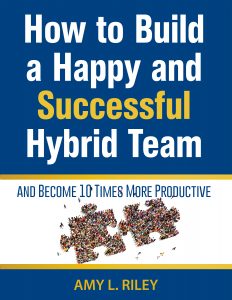
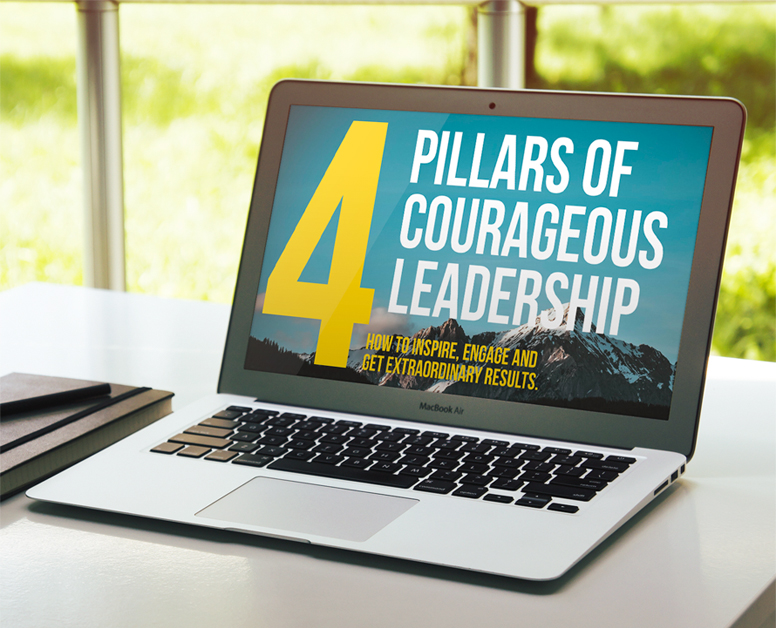 A Summary of The Courage of a Leader® 4 Pillars
A Summary of The Courage of a Leader® 4 Pillars